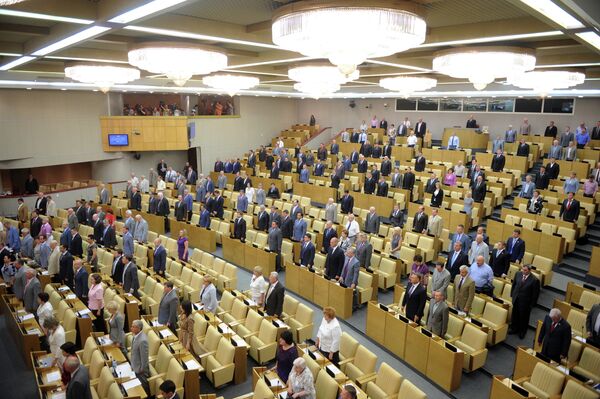Russia's lower house of parliament on Friday passed a bill forcing non-government organizations (NGO) engaged in political activity with foreign financing to be classed as "foreign agents."
Only three deputies voted against, one abstained and 374 voted in favor.
Suggested amendments to the bill from President Putin were heard in the second reading. These will exempt religious organizations, state companies and related NGOs from the provisions, as well as state, municipal and state-funded bodies.
The passage of the new law comes amidst criticism from Russian human rights organizations which say the series of Kremlin-backed laws are attempts to suppress opposition.
Under the new legislation, NGOs would have to publish a biannual report on their activities and carry out an annual financial audit. Failure to comply with the law could result in four-year jail sentences and/or fines of up to 300,000 rubles ($9,200).
Non-profit organizations which fall under the law’s jurisdiction, will be put on the “foreign agents” list what means that an NGO will be required to put a foreign agent label on all printed materials it publishes, including media materials.
In addition an NGO will need to inform the Justice Ministry about any foreign funding transactions greater than 200,000 rubles (about $7,000), it may receive, according to the amendments into the Law against Money Laundering and Terrorism Funding.
Apart from the NGO legislation, the lawmakers also passed a controversial bill criminalizing defamation, in its second and third reading on Friday.
The document, passed within a week of being filed, now has to be approved by the Federation Council and signed into law by President Vladimir Putin.
Many opposition activists and independent journalists have said the bill, which introduces hefty fines for defamation, especially toward officials, is an attempt to silence critics of the government. Journalists staged a row of solitary pickets outside the Duma building in Moscow on Friday, but failed to influence the lawmakers.
The bill could carry fines of up to five million rubles ($170,000) for misinformation damaging a person's reputation.
The new laws have already sparked international condemnation from the EU’s foreign policy chief Catherine Ashton, who expressed concern on Tuesday that amendments to the Russian NGO law may limit the space for a vibrant civil society in the country.
U.S. Secretary of State Hillary Clinton said on Tuesday that the NGO law threatened Russians’ creative potential.
Commenting on the adoption of the laws, the EU Home Affairs Commissioner, Cecilia Malmstrom, wrote in her Twitter: “Worrying laws passed by Duma on blacklisting of websites and obstacles for NGOs to act in Russia. Important to protect freedom of speech.”
Malmstrom referred to Russia’s controversial Internet Blacklist Bill approved on Wednesday that says it is necessary to combat websites that carry child pornography, drug promotion material and advice on suicide. The law will see the creation of a federal agency to rule on which websites should be closed down.
The Russian Foreign Ministry said on Friday yhe U.S. State Department expressing its concerns over Russia’s NGO and Internet blacklist law amounts to infringement in the country's internal affairs.
“Such actions can only be perceived as attempts of rude and unacceptable interference in the work of Russian state authorities and the sovereign legislative process,” said Konstantin Dolgov, the ministry’s human rights ombudsman.
“Moscow is not always satisfied with certain discussions and decisions by the U.S. Congress, but we’re principally abstaining from interfering with the legislative activity in the United States. We are entitled to expect it to be mutual,” Dolgov said.




